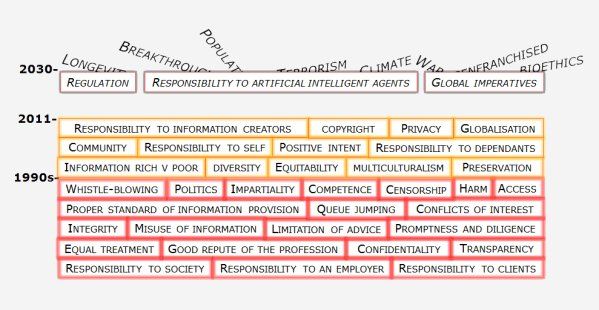
APPLIED iNFORMATION ETHICS
- Consultancy and training on ethical implications of the information worker's role
- Developing resources for continuing professional development in the library, information and cultural heritage communities
- Enhancing an understanding of ethical dilemmas and real life scenarios
- Exploring solutions for informed, reflective practice in the global digital economy
Reaching out beyond traditional librarianship, information ethics shares concerns with computer and business ethics, bioethics and the philosophy of information, offers a critical framework for understanding moral issues.
Defined by Robert Hauptman (Ethical challenges in librarianship), information ethics includes:
- informational privacy
- emerging environmental issues in the infosphere
- the life-cycle of information (creation, collection, recording, distribution, processing of information)
- ownership and copyright
- the digital divide and digital rights
a collaborative venture between Oxford Business Intelligence and InfoResponse Associates

CONTINUING PROFESSIONAL DEVELOPMENT (CPD)
- Developing training resources in collaboration with professional training and educational institutes
- promoting best practice in the information society.
case study database
- Fully anonymized scenarios
- Real life scenarios from the spectrum of professional information practice
- Each Case study analyzed by subject, sector, principles in Ethical Codes.


Learning from real-life dilemmas
Builds on extensive experience across the spectrum of professional information practice
A unique corpus for Continuing Professional Development (CPD) to develop informed training and reflective practice
Training in the ethical implications of the information worker's role.
- Developing resources for continuing professional development (CPD) in the library, information and cultural heritage communities
- Enhancing an understanding of ethical dilemmas with real life scenarios
- Exploring solutions for informed, reflective

Applied information ethics
- Offers a practical, non-judgmental framework for information workers, employers and professional bodies.
- Applies and explains Codes of Professional Practice to enhance personal decision-making, professional practice and contribute to to the development of public policy
- ownership, access, privacy, security, and community
- the relationship between information and the good of society
- the relationship between information providers and information users
- copyright protection
- intellectual freedom
- accountability, privacy, security

Historical, geo-political or cultural differences impact our ethical understanding:
- Western moral philosophies focus on rules, democracy, individual rights and personal freedoms.
- Traditional Eastern cultures focus on relationships, hierarchy, collective responsibilities and social harmony.
Information ethics examines issues arising from:
- information as a resource
- information as a product
- information as a target
The information society
An ethical foundation underpins fair, equitable and responsible professional practice and ensures Librarians, Archivists and Information Professional to understand their role as disseminators of information and their complex responsibility:
- users
- employers
- information owners
- wider society
Developments in technology and social media bring new challenges: others - who do not identify as information professionals - benefit from ethical training

InfoEthics UK
Established in 2006 by Sylvia Simmons and Jonathan Gordon-Till, co-founder members of the Professional Ethics Task Force, Institute of Information Scientists (IIS).
Invited to join the Ethics Panel, Chartered Institute of Library and Information Professionals (CILIP), contributing to the formulation and design of Ethical Code of Practice for CILIP and IIS, the UK's leading professional bodies in library, information and knowledge management.
Based in London, UK and Amsterdam, NL, designed and delivered training workshops for students and professionals in collaboration with library and information science (LIS) schools in UK and Europe.
- Developing resources for continuing professional development (CPD) in the library, information and cultural heritage communities
- Enhancing an understanding of ethical dilemmas and real life scenarios
- Exploring solutions for informed, reflective good practice
- Promoting best practice in an evolving information society
Applying ethical sensing:
- enhances decision-making
- reduces risks of non-compliance
- encourages reflective professional practice
- responds to evolving needs in information society




